Question of the Week: July 7, 2016
“Neil, the HOA requires two live oaks be planted in the parkway in front of each home in our neighborhood. Isn’t that a mistake?”
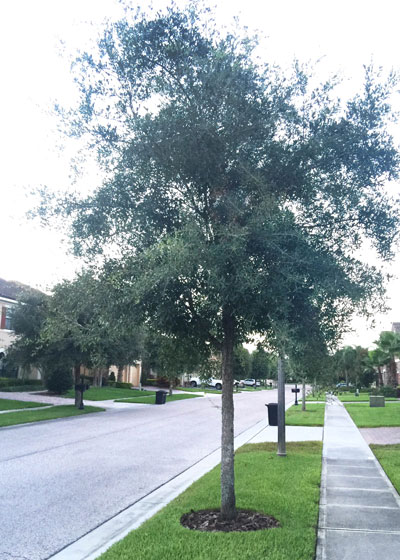
How will these landscapes fare over the next 20 to 50 years? That’s my concern.
We live out in the country. Our only HOA is what my wife says needs to happen. But I’ve seen many unbending rules administered by HOAs in the name of continuity of look. I do understand why that happens, but sometimes it seems unreasonable.
I can keep us all off the hook on this one. This is an Orlando neighborhood where my webmaster is moving. He sent me the photo and the question, but it could just as well have been from any new development in almost any city in Texas.
My first opinion: The city owns the parkway, don’t they? Don’t they have the right to dig things up whenever they want to change out a sewer or water line? Why would an HOA choose this as a place for landscaping? (Perhaps in some cities it is not city property.)
Second opinion: “Street tree” plantings went away in the Midwest when Dutch elm disease moved in and ravaged entire towns’ magnificent rows of giant American elms. That was 60 or 70 years ago. Foresters and landscape architects from that day forward have recommended plantings of mixed species as a safeguard.
Third opinion: I love live oaks. They may be my all-time favorite trees. Fact is, they probably ought to be the Texas state tree, because a huge percentage of the historic trees of Texas are live oaks. And since live oaks can live up to 1,000 years. (Goose Island Oak in South Texas as example.)
Fourth opinion, which fights against my third opinion: Live oaks may be the all-time worst trees for parkway plantings in small urban lots. I’ll give you three reasons.
1. They grow to be 75 to 80 feet across. They are low-branching and evergreen, so the shade they cast is relentless and unending. The trees in that HOA neighborhood, given 20 years to grow, will make a canopy from the front of one house to the front of the one across the street. There will be no turfgrass and no sunlight to flowering plants below.
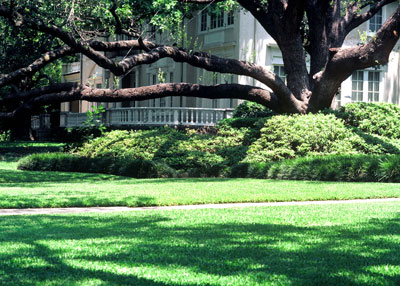
This live oak shows their huge wingspan. The surrounding trees have been trimmed to let enough light in to grow turf, but that’s not always practical.
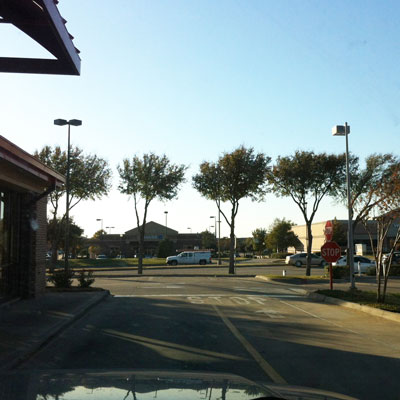
Of course, you could always “limb-up” your live oaks like this Metroplex shopping center did. Oh, my.
2. That same low, spreading canopy won’t work at all for school buses and trucks. The trees in my webmaster’s new neighborhood (top photo this page) won’t go five years before they’re flat-sized or L-shaped.
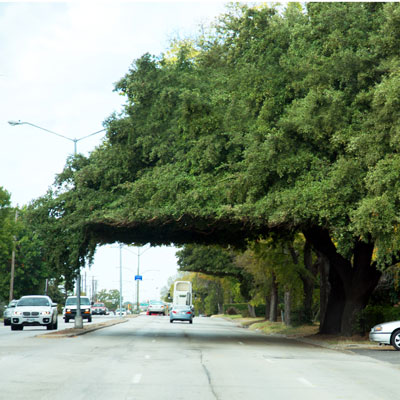
Live oaks’ branches, by nature, return to the ground. It’s part of their majesty. It doesn’t work so well, however, when buses and trucks have to pass with 8 or 10 feet of their trunks.
3. And the roots may be able to fill the entire parkways. They get huge, and they have the power to lift houses and streets, not to mention curbs and sidewalks.
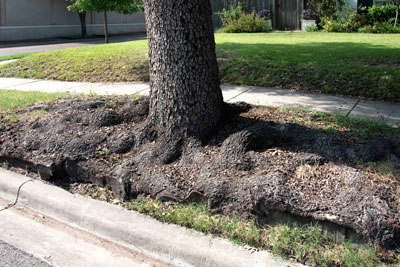
Another part of live oaks’ southern beauty is their huge, buttressing root systems. Their trunks can grow to be 5 or 8 feet in diameter (measure your parkway!), and tops of that size require ample support. This is a Highland Park tree.
So, I’m sorry to be so mean-hearted, but it’s done in the spirit of helping our cities grow into the communities of our dreams, not the nightmares of our fears.
Parkways would be better served by crape myrtles, mid-sized hollies, dogwoods (where they’re adapted), Teddy Bear magnolias and other small trees that won’t become hazards.
Hope it helps!
